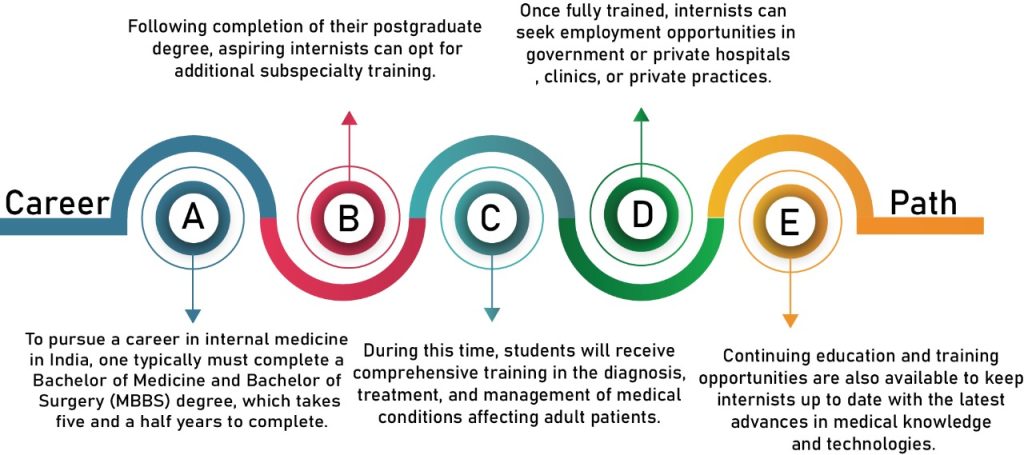Internal medicine is a branch of medicine that deals with the diagnosis and treatment of diseases affecting internal organs such as the heart, lungs, liver, kidneys, and digestive system. Physicians who specialize in internal medicine are known as internists, and they are trained to provide comprehensive care for adult patients with complex medical problems. Internal medicine encompasses a wide range of conditions, including chronic illnesses such as diabetes, hypertension, and autoimmune disorders, as well as acute illnesses such as infections and injuries. Internists are skilled in managing multiple medical conditions and coordinating care across different specialties to provide the best possible outcomes for their patients.

Work description
Internal medicine physicians, also known as internists, are responsible for the diagnosis, treatment, and management of a wide range of medical conditions affecting adults.
Their work involves conducting physical exams, ordering and interpreting diagnostic tests, developing treatment plans, prescribing medications, and providing ongoing care to patients with chronic illnesses.
Internists work closely with other healthcare professionals, including specialists, to ensure that their patients receive comprehensive and coordinated care.
They also emphasize disease prevention and health promotion, encouraging their patients to make healthy lifestyle choices and providing guidance on disease prevention strategies.
Internists may work in a variety of settings, including hospitals, clinics, and private practices.
High Demand
Diverse range of medical conditions to diagnose and treat.
Lucrative salaries
Opportunities for ongoing patient relationships and continuity of care.
Opportunities for innovation
Emphasis on disease prevention and health promotion.
Versatility
Potential for sub specialization in areas such as endocrinology or hematology.
Flexibility
High demand for internal medicine physicians due to aging population and increased need for primary care providers.
Job satisfaction
Ability to work in a variety of settings, including hospitals, clinics, and private practices.
High stress
High workload and demanding schedules, with long hours and on-call responsibilities.
Long hours
Complex and challenging patient cases requiring advanced medical knowledge and critical thinking skills.
Competitive field
Increased administrative burden, including electronic health record documentation and insurance requirements.
Constant learning
Emotionally taxing work, including dealing with patients who may be seriously ill or facing end-of-life care decisions.
Isolation
Limited time for research and academic pursuits due to clinical demands.
Eye strain and other physical health issues
Potential for burnout and job dissatisfaction due to high stress levels and workload.
The cost of pursuing a career in internal medicine in India can vary depending on a variety of factors, such as the institution and program selected, living expenses, and other associated costs.
Generally, the cost of tuition for an MD or MS program in internal medicine at a government institution in India can range from approximately INR 1-3 lakhs per year, while private institutions may charge higher fees.
Additional costs to consider include textbooks, equipment, clinical rotations, and exam fees. Living expenses will also depend on the location and individual lifestyle, but it is estimated that students in India may need anywhere from INR 10,000 to INR 30,000 per month to cover rent, food, transportation, and other living expenses.
Overall, the total cost to pursue a career in internal medicine in India can range from INR 5-20 lakhs, or even higher for students attending private institutions.
[wpcharts type=”horizontalbarchart” bgcolor=”red:gray:yellow,blue:gray:yellow,random:gray:yellow,purple:gray:yellow” min=”0″ legend=”true” titles=”2 year , 5 year” values=”3,7,5,12″]
The earning potential of an internist in India can vary depending on several factors such as the location, experience, and specialization.
On average, an internist in India can expect to earn a starting salary of around INR 6-10 lakhs per year. With experience and specialization, this figure can increase significantly, with senior internists earning upwards of INR 20-25 lakhs per year.
Additionally, internists who work in private hospitals or clinics may earn higher salaries compared to those in government or public institutions.
[wpcharts type=”horizontalbarchart” bgcolor=”red:gray:yellow,blue:gray:yellow,random:gray:yellow,purple:gray:yellow” min=”0″ legend=”false” titles=”Entry-Level, Mid-Career, Senior-Level ” values=”5,15,25,35,45,55″]
Strong academic background in science and medicine.
Excellent critical thinking and problem-solving skills.
Ability to work well under pressure and handle complex and challenging patient cases.
Compassionate and empathetic bedside manner.
Strong communication and interpersonal skills to interact effectively with patients and colleagues.
Willingness to continuously learn and keep up with the latest medical advancements.
Ability to work independently and as part of a team.
Poor academic performance or lack of interest in science and medicine.
Difficulty managing stress and pressure, leading to burnout or poor decision-making.
Lack of empathy or poor communication skills with patients and colleagues.
Inability to handle emotional or challenging patient situations.
Resistance to learning and adapting to new medical technologies and advancements.
Inability to work independently or as part of a team.
Lack of attention to detail, which can lead to medical errors and poor patient outcomes.
Work-life balance
The work-life balance of an internist can vary depending on the specific job setting and individual preferences.
Generally, internists can expect to work long hours, including weekends and evenings, especially in hospital settings where they may be on call for emergencies.
However, internists who work in outpatient clinics or private practices may have more regular hours and predictable schedules.
While the demands of the job can be intense and emotionally taxing, many internists find the work fulfilling and rewarding, with opportunities to make a significant impact on their patients’ lives.

Internists play a critical role in the healthcare system, helping to diagnose, treat, and manage a wide range of medical conditions affecting adult patients.
By providing quality medical care and improving patient outcomes, internists can contribute to the overall health and well-being of the communities they serve.
Through their work, internists can help to reduce healthcare disparities and promote greater access to quality medical care for underserved and marginalized populations.
Internists can also have a significant economic impact, as healthcare is a major sector of many economies, providing job opportunities and driving economic growth.
The work of internists can also have a positive impact on the broader medical field by contributing to research and innovation in medical science and technology.
Architectural engineers can contribute to disaster resilience by designing buildings and infrastructure that are resilient to natural disasters such as earthquakes, floods, and hurricanes.
Endo crinology
focused on the diagnosis and treatment of endocrine disorders, such as diabetes and thyroid diseases.
Hema tology
focused on the diagnosis and treatment of blood disorders, such as anemia and leukemia.
Infectious Disease
focused on the diagnosis and treatment of infectious diseases caused by bacteria, viruses, fungi, and parasites.
Neph rology
focused on the diagnosis and treatment of kidney diseases and disorders.
Pulmonary Medicine
focused on the diagnosis and treatment of respiratory system disorders, such as asthma and chronic obstructive pulmonary disease (COPD)
Conclusion:
In conclusion, internal medicine is a challenging and rewarding career choice for those with a passion for medical science and a desire to help others. While the demands of the job can be intense, with long hours and complex patient cases, the work is fulfilling and offers the opportunity to make a significant impact on patients’ lives. While the educational and financial requirements can be significant, a career in internal medicine offers both personal and professional growth, as well as the satisfaction of being part of a critical healthcare field.



